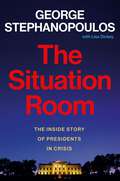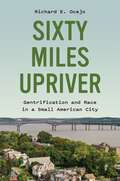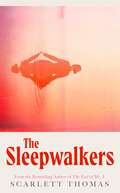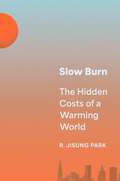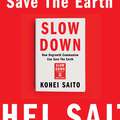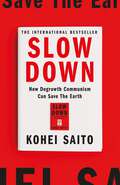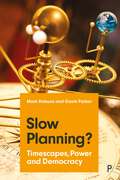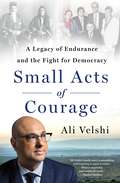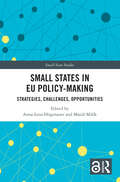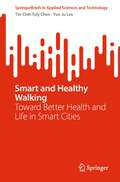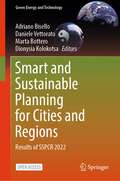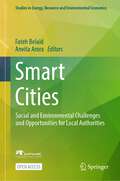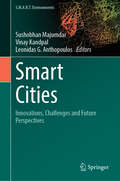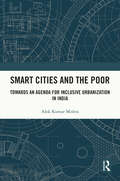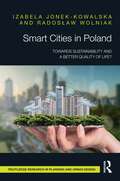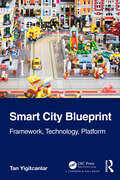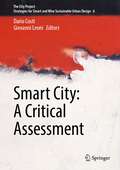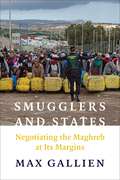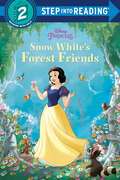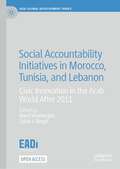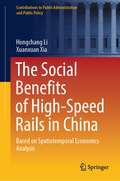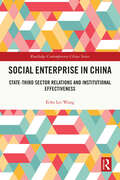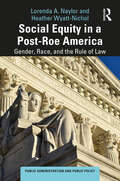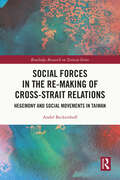- Table View
- List View
The Situation Room: The Inside Story of Presidents in Crisis
by George StephanopoulosGeorge Stephanopoulos, the legendary political news host and former advisor to President Clinton, recounts the history-making crises from the place where twelve presidents made their highest-pressure decisions: the White House Situation Room. <P><P> No room better defines American power and its role in the world than the White House Situation Room. And yet, none is more shrouded in secrecy and mystery. Created under President Kennedy, the Sit Room has been the epicenter of crisis management for presidents for more than six decades. Time and again, the decisions made within the Sit Room complex affect the lives of every person on this planet. Detailing close calls made and disasters narrowly averted, THE SITUATION ROOM will take readers through dramatic turning points in a dozen presidential administrations, including: <P><P> Incredible minute-by-minute transcripts from the Sit Room after both Presidents Kennedy and Reagan were shot <P>The shocking moment when Henry Kissinger raised the military alert level to DEFCON III while President Nixon was drunk in the White House residence <P>The extraordinary scene when President Carter asked for help from secret government psychics to rescue American hostages in Iran <P>A vivid retelling of the harrowing hours during the 9/11 attack <P>New details from Obama administration officials leading up to the raid on Osama Bin Laden <P>And a first-ever account of January 6th from the staff inside the Sit Room <P><P> THE SITUATION ROOM is the definitive, past-the-security-clearance look at the room where it happened, and the people—the famous and those you've never heard of—who have made history within its walls. <p> <b>New York Times Bestseller</b>
Sixty Miles Upriver: Gentrification and Race in a Small American City
by Richard E. OcejoAn unvarnished portrait of gentrification in an underprivileged, majority-minority small cityNewburgh is a small postindustrial city of some twenty-eight thousand people located sixty miles north of New York City in the Hudson River Valley. Like many other similarly sized cities across America, it has been beset with poverty and crime after decades of decline, with few opportunities for its predominantly minority residents. Sixty Miles Upriver tells the story of how Newburgh started gentrifying, describing what happens when White creative professionals seek out racially diverse and working-class communities and revealing how gentrification is increasingly happening outside large city centers in places where it unfolds in new ways.As New York City&’s housing market becomes too expensive for even the middle class, many urbanites are bypassing the suburbs and moving to smaller cities like Newburgh, where housing is affordable and historic. Richard Ocejo takes readers into the lives of these newcomers, examining the different ways they navigate racial difference and inequality among Newburgh&’s much less privileged local residents, and showing how stakeholders in the city&’s revitalization reframe themselves and gentrification to cast the displacement they cause to minority groups in a positive light.An intimate exploration of the moral dilemma at the heart of gentrification, Sixty Miles Upriver explains how progressive White gentrifiers justify controversial urban changes as morally good, and how their actions carry profound and lasting consequences for vulnerable residents of color.
The Sleepwalkers
by Scarlett ThomasThe scintillating new novel from the author of The End of Mr YPatricia Highsmith meets White Lotus in this compulsive and brilliant gothic thriller &‘Clever, emotionally resonant, packed with startling twists and dark turns and very funny indeed, this is fiction roaring on all cylinders.&’ Guardian &‘Through her bold storytelling, &“The Sleepwalkers&” becomes a work of peculiar, gonzo genius. … Thomas takes a glamorous late-capitalist setting, with rosé and catamarans, and shreds, twists and warps it into a story that is surprising, humane and political to its bones.&’ New York Times &‘Like a darker, funnier The White Lotus, The Sleepwalkers is horrifying in the best possible way. I loved every moment of it.&’ James Smythe &‘The Sleepwalkers is brilliant, savage and hilarious. The voice is so strong and so distinctive from the get-go, so bold and pitilessly funny. There is no whingeing here, just a fearless takedown which I read through in a single streak of pure delight. This is Scarlett's best yet, and I don't say that lightly.&’ Bidisha Mamata'The Sleepwalkers is never-endingly surprising and full of keen observations on relationships, politics, and art. Thomas makes real life so fraught with meaning, it feels hauntingly supernatural. A twisty Gothic tale of vertiginous depths and haunting power.' Sandra Newman, author of Julia 'This original thriller has plenty of surprises.' Good Housekeeping 'An attractive summer holiday read', Independent Still reeling from the chaos of their wedding, Evelyn and Richard arrive on an idyllic Greek island for their honeymoon. It&’s the end of the season and out at sea a storm is brewing. They check in to an exclusive hotel, the Villa Rosa, where the proprietor Isabella — a strangely intense woman of indeterminate accent — flirts outrageously with Richard while treating Evelyn with a rudeness bordering on contempt. Isabella tells them the story of 'the sleepwalkers': a couple who stayed at the hotel the year before and drowned in a tragic and unexplained accident. It starts to feel like the entire island is obsessed with 'the sleepwalkers', but what at first seems like a fun tale to tell before bed quickly evolves into a living nightmare. Caught in a web of deception and intrigue, where nothing and nobody are quite what they seem, Evelyn and Richard discover that their island paradise may in fact be hell on earth and that their only means of escape is to confront dark truths about themselves and those they love. Exhilarating, suspenseful, and subversively funny, in The Sleepwalkers Thomas takes elements on Daphne Du Maurier and Patricia Highsmith and blends them with her own unique sensibility to create an unforgettable thriller of rare intelligence that cements her reputation as the most exciting and original author of her generation. &‘Muriel Spark&’s disreputable niece.&’ Spectator &‘She's a genius.&’ Douglas Coupland &‘Thomas has the mesmerising power of a great story teller.&’ Financial Times &‘One of the most startling, unpredictable writers of her generation.&’ Scotsman
Slow Burn: The Hidden Costs of a Warming World
by Robert Jisung ParkHow the subtle but significant consequences of a hotter planet have already begun—from lower test scores to higher crime rates—and how we might tackle them todayIt&’s hard not to feel anxious about the problem of climate change, especially if we think of it as an impending planetary catastrophe. In Slow Burn, R. Jisung Park encourages us to view climate change through a different lens: one that focuses less on the possibility of mass climate extinction in a theoretical future, and more on the everyday implications of climate change here and now.Drawing on a wealth of new data and cutting-edge economics, Park shows how climate change headlines often miss some of the most important costs. When wildfires blaze, what happens to people downwind of the smoke? When natural disasters destroy buildings and bridges, what happens to educational outcomes? Park explains how climate change operates as the silent accumulation of a thousand tiny conflagrations: imperceptibly elevated health risks spread across billions of people; pennies off the dollar of productivity; fewer opportunities for upward mobility.By investigating how the physical phenomenon of climate change interacts with social and economic institutions, Park illustrates how climate change already affects everyone, and may act as an amplifier of inequality. Wealthier households and corporations may adapt quickly, but, without targeted interventions, less advantaged communities may not.Viewing climate change as a slow and unequal burn comes with an important silver lining. It puts dollars and cents behind the case for aggressive emissions cuts and helps identify concrete steps that can be taken to better manage its adverse effects. We can begin to overcome our climate anxiety, Park shows us, when we begin to tackle these problems locally.
Slow Down: How Degrowth Communism Can Save the Earth
by Kohei SaitoWill green capitalism save the planet? Is it even trying?Not when the very logic of the capitalist system pits it against Earth's life-support systems, as the Japanese philosopher Kohei Saito demonstrates in this astonishing international bestseller.Drawing on cutting-edge research across multiple disciplines, Saito shows how nothing but a transformation of our economic life can save us from climate collapse. Karl Marx himself reached this breakthrough at theend of his life, long before climate change had even begun. It radically altered his vision of proletarian revolution. Now that we are entering our own end-game, we must grasp Marx's final lesson before it is too late.If we are to avoid the most terrible political prospects of of climate change, the future must belong to degrowth communism, a fair and humane existence within the limits of nature. There is no alternative: the endlessacceleration of capital has run out of road. We must slow down.
Slow Down: How Degrowth Communism Can Save the Earth
by Kohei SaitoWill green capitalism save the planet? Is it even trying?Not when the very logic of the capitalist system pits it against Earth's life-support systems, as the Japanese philosopher Kohei Saito demonstrates in this astonishing international bestseller.Drawing on cutting-edge research across multiple disciplines, Saito shows how nothing but a transformation of our economic life can save us from climate collapse. Karl Marx himself reached this breakthrough at theend of his life, long before climate change had even begun. It radically altered his vision of proletarian revolution. Now that we are entering our own end-game, we must grasp Marx's final lesson before it is too late.If we are to avoid the most terrible political prospects of of climate change, the future must belong to degrowth communism, a fair and humane existence within the limits of nature. There is no alternative: the endlessacceleration of capital has run out of road. We must slow down.
Slow Planning?: Timescapes, Power and Democracy
by Mark Dobson Gavin ParkerA deep exploration on how questions of time and its organisation affect planning practice, this book questions ‘project speed’: where time to think, deliberate and plan has been squeezed. The authors demonstrate the many benefits of slow planning for the key participants, multiple interests and planning system overall.
Small Acts of Courage: A Legacy of Endurance and the Fight for Democracy
by Ali VelshiA captivating family history that illustrates how small actions can have an outsized political impact.Small acts of courage matter. Sometimes, they change the world. Our history books are filled with the stories of those who fought for democracy and freedom—for idealism itself—against all odds, from Mahatma Gandhi and Nelson Mandela to Rev. Martin Luther King, Jr. These iconic struggles for social change illustrate the importance of engagement and activism, and offer a template for the battles we are fighting today. But using the right words is often easier than taking action; action can be hard, and costly.More than a century ago, MSNBC host Ali Velshi’s great-grandfather sent his seven-year-old son to live at Tolstoy Farm, Gandhi’s ashram in South Africa. This difficult decision would change the trajectory of his family history forever. From childhood, Velshi’s grandfather was imbued with an ethos of public service and social justice, and a belief in absolute equality among all people—ideals that his children carried forward as they escaped apartheid, emigrating to Kenya and ultimately Canada and the United States.In Small Acts of Courage, Velshi taps into 125 years of family history to advocate for social justice as a living, breathing experience—a way of life more than an ideology. With rich detail and vivid prose, he relates the stories of regular people who made a lasting commitment to fight for change, even when success seemed impossible. This heartfelt exploration of how we can breathe new life into the principles of pluralistic democracy is an urgent call to action—for progress to be possible, we must all do whatever we can to make a difference.
Small States in EU Policy-Making: Strategies, Challenges, Opportunities (Small State Studies)
by Anna-Lena Högenauer and Matúš MišíkSmall States in EU Policy-Making analyses how small states try to impact European Union policy-making through a range of strategies.With the last rounds of enlargement and Brexit, the number and weight of small states in the European Union have steadily increased. At the same time, small states face distinct challenges in different institutions, which may impact their strategies. Nonetheless, the existing literature primarily focuses on the Council of the European Union and the European Council and offers few insights into how small states navigate the other institutions. The contributions to this volume examine how small states can wield influence in different institutions, arguing that they do indeed pursue different strategies depending on institutional context. The policy case studies on the EU’s foreign and security policies confirm these findings: small states can have influence in EU policy-making and can create situations where their needs are met. They are most likely to succeed when they build foreign policy coalitions, when they anticipate major economic developments and when they manage to acquire a high level of expertise in a policy area. However, the case studies also show that there is a risk of small states becoming policy-takers in cases where they cannot provide leadership in terms of ideas and expertise and/or fail to build political weight through coalitions.This book will be of interest to academics and practitioners of European politics and the EU in particular, as well as policy-makers and practitioners working on small states.The Open Access version of this book, available at http://www.taylorfrancis.com, has been made available under a Creative Commons Attribution-Non Commercial-No Derivatives (CC-BY-NC-ND) 4.0 license.
Smart and Healthy Walking: Toward Better Health and Life in Smart Cities (SpringerBriefs in Applied Sciences and Technology)
by Tin-Chih Toly Chen Yun-Ju LeeThis book examines smart technologies and their invaluable role in augmenting the walking experience of mobile users. From meticulously planned walking routes to precise footprint detection and analysis, as well as cutting-edge fall detection and prevention mechanisms, these intelligent technologies have the potential to revolutionize healthy and smart walking. Against the backdrop of the post-COVID-19 era, where unrestricted mobility has become pivotal for restoring normalcy, the demand for smart healthcare solutions has soared. The book explores latest advances in sensor technology, cloud computing, deep learning, and networking and related innovative applications that can leverage smart technologies to enhance healthy walking.
Smart and Sustainable Planning for Cities and Regions: Results of SSPCR 2022 (Green Energy and Technology)
by Adriano Bisello Daniele Vettorato Marta Bottero Dionysia KolokotsaThis open access book includes a selection of innovative contributions presented at the 4th international conference “Smart and Sustainable Planning for Cities and Regions 2022”, held in Bolzano, Italy in July 2022. Featuring 10 papers by academics and consultants, strongly rooted in practical experiences and international projects, it discusses current ground-breaking research in innovative and sustainable planning for cities, with a focus on the environmental, economic, and social challenges associated with the global sustainability transition and energy systems integration. The contributions are illustrative of the richness of the issues discussed and the breadth of the emerging themes, including innovative business models for building and infrastructure at district level, integrated sustainability assessment schemes for Positive Energy Districts, a material flow accounting model for regional metabolism, energy communities as a lever to promote historical and landscape values, optimized and electrified last-mile logistics, multi-criteria decision analysis tools to redefine center/periphery relationships, a framework for socio-spatial analysis related to social practices, design principles and communication technologies improving both indoor and outdoor public spaces, augmented nature-based solution coupling the green elements with the latest technologies to deliver healthier and more appealing cities.
Smart Cities: Social and Environmental Challenges and Opportunities for Local Authorities (Studies in Energy, Resource and Environmental Economics)
by Fateh Belaïd Anvita AroraThis edited volume discusses the socioeconomic, environmental, and policy implications of smart cities. Written by international experts in energy economics and policy, the chapters present wide range of high quality theoretical and empirical studies at the nexus of social, entrepreneurial, governmental and ecological transformation. The book covers a wide range of topics, with a view towards providing empirical evidence of the benefits of smart cities as well as practical frameworks for smart city initiatives. Topics discussed include: smart city transition pillars, innovation for smart and sustainable cities design and implementation, smart city governance, smart mobility within cities, and smart cities in emerging economies. This volume will be of use to students and researchers interested in resource economics, energy economics, sustainability, ICT, and governance, as well as policymakers working on smart city initiatives.This is an open access book.
Smart Cities: Innovations, Challenges and Future Perspectives (S.M.A.R.T. Environments)
by Leonidas G. Anthopoulos Sushobhan Majumdar Vinay KandpalThis book aims to integrate new technologies and adaptation tools into the process of smart city planning. It also emphasizes the value and importance of modern technologies such as IoT and data science as a smart technology for the formation of a smart city. The authors believe that various technologies in a smart city will reduce all the problems for the sustainable growth and future prospects of the city. The first section of this book discusses the innovation of new technologies (AI, data science, block chain, etc.) that has flourished in recent decades which will make the city smarter. This section also describes that block chain and IoT (Internet of Things) are two transformative technologies that can greatly impact smart cities by enhancing security, improving transparency, and enabling efficient management of resources. The second section of the book explains about the uses of AI tools and smart technologies (like waste management, public safety and security) for the development and management of smart cities. This chapter also describes AI-powered systems that are integrated into smart buildings to optimize energy usage, enhance occupant comfort, and improve building management. These systems can adjust lighting and HVAC settings based on occupancy, learn user preferences, and provide personalized energy efficiency recommendations. The third portion of the book investigates the recent challenges and barriers of smart city that have been faced by the smart cities in the recent decades. This section also describes various challenges and barriers for the implementation of IoT sensor, AI technologies, etc., for the formation of a smart city. The future prospects of a smart city are the main theme of the last chapter. In this section, an attempt has been made about the future vision and outlook of the smart city. This chapter also describes different approaches (like smart grid, societal smart city, smart city model, etc.) for the future planning and management of the city.
Smart Cities and the Poor: Towards an Agenda for Inclusive Urbanization in India
by Alok Kumar MishraDeveloping countries worldwide have been embarking on ‘smart cities’ programmes using new technology solutions to improve public services. Faced with severe problems of digital divide, poverty, unemployment, inequality, and financial and social exclusion, these cities have to negotiate hard in order to reach their goals. This book examines urban governance, digital divide, poverty, unemployment, and financial and social exclusion and presents a theoretical perspective on inclusive cities, urbanization, migration, slums,and affordable housing. The book aims at formulating and implementing an agenda for inclusive, equitable, and sustainable urban development in tune with the UN-SDGs, the New Urban Agenda of Habitat III, and India’s new national urban missions. It probes into the scope of adopting inclusionary urban planning, zoning, and housing, financing inclusive city development, and poverty alleviation through municipal finance reforms using findings and lessons from detailed field studies of Indian cities. It also suggests an agenda for slum-free and poverty-free cities in an attempt to make these cities more people-focused, humane, and inclusionary. This book will be of interest to scholars and researchers of political science, policy studies, public administration, urban studies, urban planning and management, urban sociology, and geography, besides being of interest to policy researchers, community workers, grass roots researchers, policymakers, and sociologists.
Smart Cities and the Poor: Towards an Agenda for Inclusive Urbanization in India
by Alok MishraDeveloping countries worldwide have been embarking on ‘smart cities’ programmes using new technology solutions to improve public services. Faced with severe problems of digital divide, poverty, unemployment, inequality, and financial and social exclusion, these cities have to negotiate hard in order to reach their goals. This book examines urban governance, digital divide, poverty, unemployment, and financial and social exclusion and presents a theoretical perspective on inclusive cities, urbanization, migration, slums,and affordable housing.The book aims at formulating and implementing an agenda for inclusive, equitable, and sustainable urban development in tune with the UN-SDGs, the New Urban Agenda of Habitat III, and India’s new national urban missions. It probes into the scope of adopting inclusionary urban planning, zoning, and housing, financing inclusive city development, and poverty alleviation through municipal finance reforms using findings and lessons from detailed field studies of Indian cities. It also suggests an agenda for slum-free and poverty-free cities in an attempt to make these cities more people-focused, humane, and inclusionary.This book will be of interest to scholars and researchers of political science, policy studies, public administration, urban studies, urban planning and management, urban sociology, and geography, besides being of interest to policy researchers, community workers, grass roots researchers, policymakers, and sociologists.
Smart Cities in Poland: Towards sustainability and a better quality of life?
by Izabela Jonek-Kowalska Radosław WolniakThis book considers and examines the concept of a Smart City in the context of improving the quality of life and sustainable development in Central and Eastern European cities. The Smart City concept has been gaining popularity in recent years, with supporters considering it to be an effective tool to improve the quality of life of the city’s residents. In turn, opponents argue that it is a source of imbalance and claim that it escalates the problems of social and economic exclusion. This book, therefore, assesses the quality of life and its unsustainability in Central and Eastern European cities within the context of the Smart City concept and from the perspective of key areas of sustainable development. Using case studies of selected cities in Central and Eastern Europe and representative surveysof Polish cities, this book illustrates the process of creating smart cities and their impact on improving the quality of life of citizens. Specifically, this book investigates the conditions that a Smart City has to meet to become sustainable, how the Smart City concept can support the improvement of the residents’ quality of life and how Central and Eastern European countries create smartcity solutions. Containing both theoretical and practical content, this book will be of relevance to researchers and students interested in smart cities and urban planning, as well as city authorities and city stakeholders who are planning to implement the Smart City concept.
Smart City Blueprint: Framework, Technology, Platform
by Tan YigitcanlarThe smart city movement, during the last decade and a half, advocated the built environment and digital technology convergence with the backing of institutional capital and government support. The commitment of a significant number of local governments across the globe, in terms of official smart city policies and initiatives, along with the constant push of global technology giants, has reinforced the popularity of this movement. This two-volume treatment on smart cities thoroughly explores and sheds light on the prominent elements of the smart city phenomenon and generates a smart city blueprint. This first volume, with its 12 chapters, provides a sound understanding on the key foundations and growth directions of smart city frameworks, technologies, and platforms, with theoretical expansions, practical implications, and real-world case study lessons. The second companion volume offers sophisticated perspectives on the key foundations and directions of smart city policies, communities, and urban futures, with theoretical expansions, practical implications, and real-world case study lessons. This book is an invaluable reference source for urban policymakers, managers, planners, practitioners, and many others, particularly to benefit from it when tackling key urban and societal issues and planning for and delivering smart city solutions. Moreover, the book is also a rich and important repository for scholars and research and undergraduate students as it communicates the complex smart city phenomenon in an easy to digest form, by providing both the big picture view and specifics of each component of that view. It also appeals to local government agencies and smart city practitioners.
Smart City: A Critical Assessment (The City Project #6)
by Dario Costi Giovanni LeoniThis contributed volume reports on a multidisciplinary collective work on the topic of Smart City, merging scientific reflections and operational issues. Here, current Smart Cities concepts are subjected to criticism, while the related terminology has been updated to contemplate a model of urban development capable of integrating technical and humanistic culture by fostering an open dialogue between different stakeholders. Upon an introduction to the state of the art, this book presents a glossary of definitions and concepts around the contemporary city, and five interviews with researchers and scholars of different background. The last chapter summarizes current challenges in designing the city of the future, highlighting new research directions in home-infrastructure, small smart city, energy transition, connectivity, digitalization and autonomous and connected mobility.Written by the members of the Scientific Committee of the Smart City 4.0 Sustainable LAB ResearchLaboratory, an inter-university network including research groups from the University of Parma, University of Modena and Reggio Emilia, University of Bologna, University of Ferrara, the Polytechnic University of Milan, and the Catholic University of Milan with its Piacenza campus, this book offers a source of inspiration for other researchers and stakeholders, and it is intended to foster collaborations between different stakeholders - and possibly countries – to develop future cities that are wise, green, sustainable and inclusive.
Smugglers and States: Negotiating the Maghreb at Its Margins (Columbia Studies in Middle East Politics)
by Max GallienSmuggling is typically thought of as furtive and hidden, taking place under the radar and beyond the reach of the state. But in many cases, governments tacitly permit illicit cross-border commerce, or even devise informal arrangements to regulate it. Drawing on extensive fieldwork in the borderlands of Tunisia and Morocco, Max Gallien explains why states have long tolerated illegal trade across their borders and develops new ways to understand the political economy of smuggling.This book examines the rules and agreements that govern smuggling in North Africa, tracing the involvement of states in these practices and their consequences for borderland communities. Gallien demonstrates that, contrary to common assumptions about the effects of informal economies, smuggling can promote both state and social stability. States not only turn a blind eye to smuggling, they rely on it to secure political acquiescence and maintain order, because it provides income for otherwise neglected border communities. More recently, however, the securitization of borders, wars, political change, and the pandemic have put these arrangements under pressure. Gallien explores the renegotiation of the role of smuggling, showing how stability turns into vulnerability and why some groups have been able to thrive while others have been pushed further to the margins. With both rich empirical detail and novel theoretical contributions, Smugglers and States offers important insights into security and stability in North Africa and the prospects for economic inclusion in a context where many livelihoods exist outside of the law.
Snow White's Forest Friends (Step into Reading)
by Nicholas TanaDiscover how Princess Snow White from Disney Snow White and the Seven Dwarfs met her animal friends in this Step 2 Step into Reading levelled reader! Perfect for beginning readers ages 4 to 6.One sunny spring morning, Princess Snow White wakes up to find a bunny stuck in the bottom of her wishing well. With some quick thinking and the help of the other animals in the forest, can Snow White rescue the bunny? Young readers and Disney Princess fans will love this sweet story about helping others and new friends.Step 2 readers use basic vocabulary and short sentences to tell simple stories. For children who recognize familiar words and can sound out new words with help.
Social Accountability Initiatives in Morocco, Tunisia, and Lebanon: Civic Innovation in the Arab World After 2011 (EADI Global Development Series)
by Ward Vloeberghs Sylvia I. BerghThis Open Access Pivot represents the first extensive exploration of social accountability within the Arab world following the 2011 Arab uprisings. Drawing on insights from development studies, comparative politics, and Middle East studies, the authors explore the evolution of accountability as a governance concept, review theories on social accountability’s role in improving public service delivery, and categorize types of social accountability initiatives, highlighting respective strengths and weaknesses. Detailed country chapters provide a solid basis for the comparative approach which reveals major variations in meanings of accountability, mobilization strategies, and official responses, rooted in the specific sociopolitical contexts of each country. Moreover, the book analyzes the influence of political and economic elites as well as the nature of popular mobilisation on accountability dynamics in the region. The authors conclude by discerning differences and commonalities across cases and offer recommendations for policymakers, donors, and practitioners seeking to enhance the effectiveness of social accountability initiatives. They address challenges such as the lack of enforcement mechanisms, the difficulty of scaling up initiatives, and the ambiguous effects of international interventions. This pioneering Pivot fills a significant void in the study of social accountability in the MENA region and provides a compelling framework for future research and policy design, making it an indispensable resource for experts and scholars.
The Social Benefits of High-Speed Rails in China: Based on Spatiotemporal Economics Analysis (Contributions to Public Administration and Public Policy)
by Hongchang Li Xuanxuan XiaThis book summarizes the quantitative research methods related to the social benefits of high-speed rails. It also explores the political, economic, technological, social and environmental impacts of high-speed rails. As China's new national business card, high-speed railways not only reflect the advanced technology of Chinese railways but also reflect China's increasing comprehensive national power. The highlight of the book is to conduct multidimensional analysis of the social benefits of the high-speed rail with a focus of spatiotemporal economics analysis.
Social Enterprise in China: State-Third Sector Relations and Institutional Effectiveness (Routledge Contemporary China Series)
by Echo Lei WangWang offers an empirically based exploration into work-integration social enterprises as a means for delivering social services in China. Focusing on the political economy of social enterprise development in China, Wang examines the nature of the relationship between the state and social enterprises and the implications of such relationships for their institutional effectiveness. She adopts a bottom-up approach that investigates indigenous practices embedded within the local political context. Common ground has been established internationally that the social enterprise model provides new ways of social service delivery that could potentially change and restructure the social welfare economy. However, the development path differs across social contexts, especially in an authoritarian country like China. This study provides insights into China's efforts to develop its social welfare sector and reinvigorate customary ideas about how public services could be better offered given the country's political economy. This book will be of great interest to both scholars of China’s political economy and those with an interest in the development of the social enterprise sector looking to see how this works in a Chinese context.
Social Equity in a Post-Roe America: Gender, Race, and the Rule of Law (Public Administration and Public Policy)
by Lorenda A. Naylor Heather Wyatt-NicholDespite hundreds of federal laws and U.S. Supreme Court decisions prohibiting discrimination based on sex and race, American women and people of color continue to face pervasive individual and structural discrimination. Women often lack equal pay for equal work, affordable childcare, and paid family medical leave. Following the overturning of Roe vs. Wade, safe, legal abortion has become inaccessible in approximately half the country, disproportionately impacting poor women. Women and people of color are underrepresented in elected offices at the federal and state levels, and the voting rights of people of color continue to be eroded. Employing a public administration framework, Social Equity in a Post-Roe America documents the scope and breadth of inequality in the United States, linking social equity to sex, race, and the rule of law.This insightful and provocative new book examines U.S. Supreme Court decisions and federal statutes across four public policy domains that increasingly influence U.S. democracy and impact the lives of American women. These policy domains consist of political representation, which includes citizenship and voting rights, contraception, abortion, and employment. Social Equity in a Post-Roe America offers policy recommendations to increase equitable access and equal opportunity for women and people of color. It is required reading for all students of public administration, public policy, and political science, as well as for engaged citizens.
Social Forces in the Re-Making of Cross-Strait Relations: Hegemony and Social Movements in Taiwan (Routledge Research on Taiwan Series)
by André BeckershoffAdopting a critical political economy perspective this book sheds new light on the social and political struggles that shaped the political dynamics of Taiwan-China relations and cross-Strait rapprochement between 2008 and 2014. Presenting a careful analysis of primary sources and interviews, the book reconstructs the historical, political and socio-economic factors that shaped Taiwan’s path to the Sunflower Movement of 2014, reinterpreting this process as a struggle over Taiwan’s role in the global economy. It challenges received wisdoms regarding the rise and fall of the rapprochement: First, the study argues that the rapprochement was not primarily driven by political elites but by capitalist conglomerates within Taiwan, which sought a normalisation of economic relations across the Taiwan Strait. Second, it finds that Taiwan’s social movements during that period were not homogeneous but rather struggled to find a common vision that could unite the critics of the rapprochement. The insights provided not only offer a deeper understanding of Taiwan’s protest cycle between 2008 and 2014, but also serve to recontextualise the political dynamics in post-Sunflower Taiwan. As such it will appeal to students and scholars of Taiwan Studies, East Asian Politics and Social Movement Studies.
